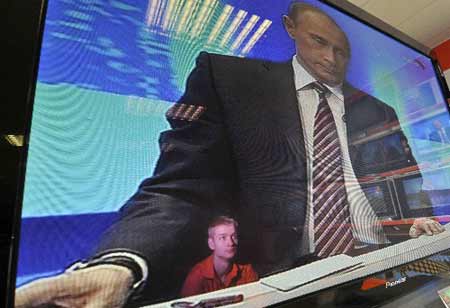Russian-US ties
Asked about how he saw the future of Russian-US ties, the head of government expressed optimism that relations with the United States would improve after US president-elect Barack Obama takes office.
"We hope very much that there will be positive changes, and now we receive such signals," he said, referring to Obama's reservation about NATO's eastward expansion as well as the deployment of a missile shield in Central Europe.
NATO foreign ministers decided Tuesday in Brussels to delay Ukraine and Georgia's admission to the Membership Action Plan, a key step for entry into the military alliance.
The Bush administration is planning to deploy 10 missile interceptors in Poland and a radar system in the Czech Republic as part of its European missile shield, which was strongly opposed by Russia. But Obama has not committed to the missile defense shield in Europe.
The future US leadership has indicated that Russia's interests will be given more consideration in building bilateral relations, Putin said.
"If these are not just words, if they are translated into practical policy, we will respond accordingly, and our American partners will immediately feel this."
The prime minister also ruled out possibility that Russia would establish permanent military bases in Venezuela or Cuba, the so-called backyard of Washington.
"There is no need to build permanent bases... If necessary, we will be able to use these countries' ports to refuel and replenish supplies for our warships," he said.
 |
|
A shop keeper is reflected in a television screen at an electronics shop in Veliky Novgorod during Russian Prime Minister Vladimir Putin's annual question-and-answer session with the Russian people, December 4, 2008. [Xinhua/Reuters]
|
Return to Kremlin
Answering questions from the Russian citizens, Putin also described President Dmitry Medvedev's proposal to extend presidential term as reasonable.
"Longer office (of the president) is a matter of taste to a certain extent. Yet I think this proposal is justifiable in such a huge country as Russia," he said.
After the televised question-and-answer session, Putin told reporters he would think about running for president again and make a decision by 2012.
"The next elections are in 2012, meanwhile everybody should toe the line. Let's not make a fuss," he said.
Both houses of Russia's parliament approved in November constitutional changes extending the presidential term from four to six years and the lower house term from four to five years.
Medvedev's proposal, which he made in his first state-of-the-nation address on November 5, was seen by some analysts as an attempt to pave the way for Putin to return to the Kremlin.
However, in response to a question from the host as to how he feels in the premier's armchair, Putin said he was happy in his current post, dismissing speculation that he was planning a way to return soon as president.
The premier also told reporters that his power tandem with Medvedev was very effective.
(Xinhua News Agency December 5, 2008)